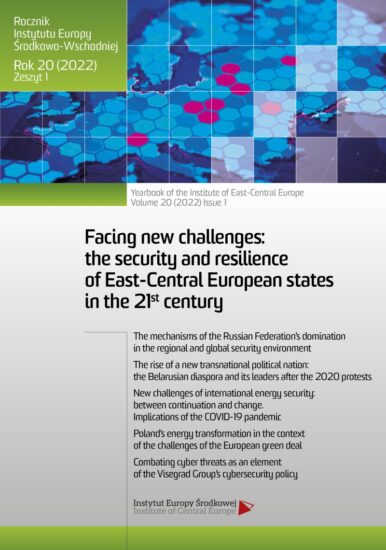Zwalczanie cyberzagrożeń jako element polityki cyberbezpieczeństwa państw Grupy Wyszehradzkiej
ORCID: Marek Górka: 0000-0002-6964-1581
Afiliacja: Koszalin University of Technology, Poland
Pages: 121-142
Edition: Lublin 2022
DOI: https://doi.org/10.36874/RIESW.2022.1.7
Citation method: M. Górka, Combating cyber threats as an element of the Visegrad Group's cybersecurity policy, „Rocznik Instytutu Europy Środkowo-Wschodniej” 20(2022), z. 1, s. 121-142, DOI: https://doi.org/10.36874/RIESW.2022.1.7.
Abstract:
The Visegrad Group countries are taking actions that confirm their ambitions in the framework of cyber security policy. The tasks formulated both in strategic documents and in international forums are evidence of the active role of Central European governments in the area of cyber security. Many countries are facing a rising tide of cyberattacks, which are likely to intensify over time. Any such incident has the potential to inflict significant damage, undermining trust in government and causing unpredictable political consequences. For this reason, there is an apparent desire on the part of the V4 countries to build common cyber resilience based on close cooperation with the EU and NATO. Another way of describing the actions taken in the article is budget spending on cyber security, which is an important measure for assessing the development of the cyber capabilities of individual countries. The article is an attempt to summarize the actions taken by the V4 countries in the period 2013-2021 within the framework of cyber security policy, which for the most part remains in the sphere of mere political declarations. The research analysis undertaken can serve as a starting point for further consideration of V4 cooperation especially in the context of the military aggression of the Russian Federation after 24 February 2022. This event mandates consideration of the future of cooperation between Central European countries – in the broadest sense – on security policy.
Bibliography:
Antczak J., Nakłady na cyberbezpieczeństwo państw Grupy Wyszehradzkiej, Warsaw Institute, 24 September 2018, https://warsawinstitute.org/pl/naklady-na-cyberbezpieczenstwo-panstw-grupy-wyszehradzkiej.
Axelrod R., Iliev R., Timing of cyber conflict, “PNAS” 2014, vol. 111, no. 4.
Bedea C.M., Kwadwo V.O., Opportunistic sub-regionalism: the dialectics of EU-Central-Eastern European relations, “Journal of European Integration” 2021, vol. 43, no. 4.
Cavelty M.D., Wenger A., Cyber security meets security politics: Complex technology, fragmented politics, and networked science, “Contemporary Security Policy” 2020, vol. 41, no. 1.
Cyber Threat Report CEE 2018, Instytut Kościuszki, 14 June 2018, https://ik.org.pl/publikacje/cyber-threat-report-cee-2018.
Czech Republic 2018-2022 (2018): Cyber Defence Strategy of the Czech Republic 2018-2022, https://ccdcoe.org/library/strategy-and-governance.
Egloff F., Cybersecurity and the Age of Privateering, [in:] Understanding Cyber Conflict. 14 Analogies, G. Perkovich, A. Levite (eds.), Georgetown 2017.
Gawron-Tabor K., New Quality of Defence Cooperation within the Visegrad Group in 2010-2014, “Obrana a Strategie” 2015, vol. 1.
Goldman E., Warner M., Why a Digital Pearl Harbor Makes Sense… and Is Possible, [in:] Understanding Cyber Conflict. 14 Analogies, G. Perkovich, A. Levite (eds.), Georgetown 2017.
Hersh S.M., The Online Threat, Should we be worried about a cyber war?, New Yorker, 1 November 2010, https://www.newyorker.com/magazine/2010/11/01/the-online-threat.
Lin H., Escalation dynamics and conflict termination in cyberspace, “Strategic studies quarterly” 2012, vol. 6, no. 3.
Lisiak-Felicka D., Information Security Incidents: A comparison between the Czech Republic and Poland, 20th International Scientific Conference, “Economic and Social Development” 2017, vol. 20.
Lonsdale D.J., The Ethics of Cyber Attack: Pursuing Legitimate Security and the Common Good in Contemporary Conflict Scenarios, “Journal of Military Ethics” 2020, vol. 19, no. 1.
Mačák K., Decoding Article 8 of the International Law Commission’s Articles on State Responsibility: Attribution of cyber operations by non-state actors, “Journal of Conflict and Security Law” 2016, vol. 21, no. 3.
Simons G., Danyk Y., Maliarchuk T., Hybrid war and cyber-attacks: creating legal and operational dilemmas, “Global Change, Peace & Security” 2020, vol. 32, no. 3.
Stańczyk K., Zarządzanie bezpieczeństwem zewnętrznym państwa przy wykorzystaniu instrumentów planowania budżetowego, [in:] Współczesne zagrożenia w zarządzaniu i bezpieczeństwie, Z. Grzywna (ed.), Katowice 2014.
Valeriano B., Maness R.C., The Dynamics of Cyber Conflict between Rival Antagonists, 2001-2011, “Journal of Peace Research” 2014, vol. 51, no. 3.
Warner J., Chapin E., Matfess H., Suicide Squads: The Logic of Linked Suicide Bombings, “Security Studies” 2019, vol. 28, no. 1.
Wirtz B.W., Weyerer J.C., Cyberterrorism and Cyber Attacks in the Public Sector: How Public Administration Copes with Digital Threats, “International Journal of Public Administration” 2017, vol. 40, no. 13.

PDF: Download